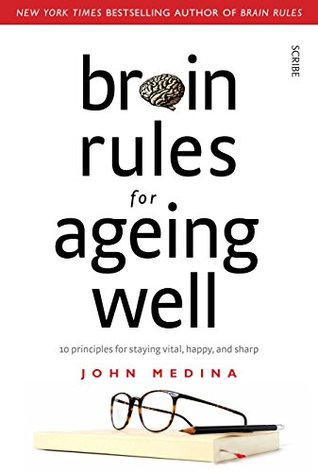More on this book
Community
Kindle Notes & Highlights
by
John Medina
Read between
October 14, 2018 - January 9, 2019
“The single thing that comes close to a magic bullet, in terms of its strong and universal benefits, is exercise.”
purpose: to project its owner’s genes into the next generation. Though it is only 2 per cent of your body’s weight, your brain consumes 20 per cent of the calories you eat.
the amount of food people consume and the type of food they consume.
It’s been observed for centuries that people who eat less seem to live longer—and are oddly happier—
“Eat food. Not too much. Mostly plants.”
Cutting caloric intake has been shown to reduce chemicals associated with age-wrecking inflammation, improve sleep and mood, and boost energy level—all findings associated with longer life.
Diets rich in vegetables, nuts, olive oil, berries, fish, and whole grains (such as the Mediterranean diet or the MIND diet) have been shown to improve working memory and lower the risk of Alzheimer’s.
I’ve reached the age where happy hour is a nap. —Anonymous
Pay attention to the afternoon. Getting a good night’s sleep starts with paying attention to what you’re doing four to six hours before you go to bed. No caffeine six hours prior. No nicotine. No alcohol, either. Alcohol, legendary for inducing drowsiness, is
actually a biphasic molecule possessing both sedating and stimulating properties. Drowsiness occurs initially; the stimulating effect much later.
Exercise has a profoundly positive effect on your ability to sleep, but you want to ...
This highlight has been truncated due to consecutive passage length restrictions.
Designate a place in your house where the only activity is sleep.
THE MOVIE COCOON has
Long-term partners become emotionally closer when reminiscing about shared memories
Helen divides the paper into two columns. She writes in the first column three things that happened that day—things that made her smile or made her feel grateful. In the second column, she describes why the events gave her such feelings. Popular on this list are interactions with the grandkids, which make her feel connected. Another is the ability to still drive, and she’s grateful for the independence. Helen has discovered that even on her crummiest days, there’s still something to appreciate. She puts the list on her nightstand, climbs into bed, and is soon fast asleep. Next morning, the
...more
she can to change both the number and quality of her days.
Brain science clearly confirms the obvious health benefits of reducing stress.
Mindfulness training is a powerful
way to get...
This highlight has been truncated due to consecutive passage length restrictions.
Optimistic people live almost eight years longer than the glass-half-empties do.
Keeping your mind active—whether reading or learning a new language
Never retire, and be sure to reminisce
Nostalgia is
tend to be active, eat well, reduce stress, stay optimistic, and maintain a social life.
It’s never too late to embrace your friends, write down what you’re grateful for, learn a language, learn to dance a jig, learn anything.


